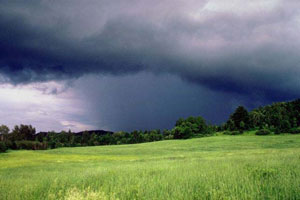| |
The Lord said
to Elijah, ‘Go back the way you came, and go to
the Desert of Damascus. When you get there,
anoint Hazael king over Aram. Also, anoint Jehu
son of Nimshi king over Israel, and anoint
Elisha son of Shaphat from Abel Meholah to
succeed you as prophet. Jehu will put to death
any who escape the sword of Hazael, and Elisha
will put to death any who escape the sword of
Jehu. Yet I reserve seven thousand in Israel –
all whose knees have not bowed down to Baal, and
all whose mouths have not kissed him.
(1 Kings 19:15-18) |
|
The people of Israel may
have renounced Baal worship, but their hearts were still
hard. Three years of drought had neither weaned them
from their backslidings nor turned them to the Lord. We
can discern a wealth of hidden meaning, therefore,
behind the Lord’s commission to appoint Hazael and Jehu
to be the next monarchs of their nations.
First, Elijah was told to appoint Hazael to be the next
king of the powerful Aramean (Syrian) nation. Here was a
man who would stoop to anything in order to fulfil his
ambitions, and who would one day launch an invasion
against Israel. Secondly, Elijah was sent next to
proclaim Jehu, a rough and ready army man, to be the
next king of Israel, with the express purpose of making
him the scourge of the house of Ahab. Elijah’s final
commission was to appoint a young farmer as his own
successor.
For a man who had so recently believed himself to be
indispensable for the task of delivering Israel from its
apostasy, this last command must have been particularly
welcome. Elijah had repeatedly lamented that he alone
was faithful in the land, and here was God, raising up
the perfect companion for him. Whereas Saul hounded
David at the point of his spear, Elijah would do
everything he could to develop Elisha’s ministry. The
contrast could hardly be greater between Elijah’s
nurturing spirit and King Saul’s insane jealousy.
It is always God’s way that others should take our
place, and go further than we ourselves have done.
Any
church that is failing to plan ahead to raise up its
successors is lacking in its vision, for the Lord is
always thinking of the next generation. |
 |
The Judgement of God
It is important for us to try to understand why such
motley people as Jehu and Hazael were needed to complete
God’s dealings with His rebellious people. The fact that
God was prepared to appoint them at all is a reminder
that His purposes stretch far beyond the walls of Church
or Temple.
Earlier, we made a comparison between Elijah and
Habakkuk. It is a curious coincidence that in both
generations, God’s plan involved the raising up of
unscrupulous men to be the scourge of His people. By
choosing Hazael to be king over Aram, God was declaring
that His time had come for the dynasty of Benhadad.
Since Hazael would shortly invade Israel, it is hard to
interpret this appointment in any other light than as a
judgement on apostate Israel.(1) Jehu may have served to
rid the land of the worst excesses of Baal worship, but
he can hardly be considered a paradigm of righteousness.
This theme of judgement is never far from the Elijah
narrative. What is important to realise is that this is
far from being some obscure Old Testament concept. The
judgements of God are everywhere in the Bible, but all
too little attention is given to the subject in most
churches today.(2)
 |
Those who uncompromisingly proclaim the wrath of God,
unrelieved by a proper appreciation of His mercy and
long-suffering, tend to display all the winsomness of a
chunk of granite!
For lack of a proper understanding of
this theme, however, many Christians know all too little
of the fear of God in their lives.
So it is that some
churches have wandered off into mere sentimentality,
while others have become doctrine-bound through fear of
embracing error. Both extremes are a distortion. |
We find the perfect balance in the Person of the Lord
Jesus Himself, who came into the world full of grace and
truth.(3) Had He come only with grace, history might
perhaps remember Him as little more than a laissez-faire
do-gooder, effectively preaching a
‘Do-what-you-please-if-it-makes-you-feel-good’ message.
Nothing could be further from the Jesus we meet in the
gospels. Equally, were He to treat us purely as we
deserve according to His absolute holiness, then which
of us would not be crushed by the weight of our
sinfulness?
We need experience no confusion in reconciling the God
of Love with the One who was and is the Judge of all the
World. He is and always has been the God of all mercy,
but when unconfessed sin encounters the holiness and
zeal of the Lord, then shaking and judgement are
inevitable.
The Wrath of God
This is where our study of the life of Elijah bears
so heavily on our own condition today. We too are part
of a society that has turned to embrace whichever
pleasures, fancies or gods that most appeal to us. Are
we too not ripe for judgement? In Billy Graham’s words,
‘If God spares the nations of the West, He will have
to apologise to Sodom and Gomorrah!’
God is angry when the Church pronounces arbitrarily on
issues He has already declared to be absolutes, and when
we fail to make a clear distinction between right and
wrong. The modern habit of ridiculing certainty, and
elevating doubt, is not glorifying. Scripture is full of
warnings that, where there is insufficient repentance,
the Lord Jesus will ‘come and fight against us with
the sword of His mouth.’ (4) There is a real danger
that God will hide His face from us, and allow more and
more disasters to be visited on us.(5)
One reason why so many fail to heed these warnings is
because they have been taught to dismiss all talk of
God’s wrath. It is neither ‘politically correct’, nor
does it fit in with people’s picture of how they would
like God to be. Moreover, we tend to associate wrath
with destructive emotions. After all, we usually regret
it when we lose our tempers! But human anger is neither
a full nor an accurate picture of the wrath of God.
 |
Scripture teaches so plainly about the wrath of God that
we simply cannot afford to heed the siren songs of those
who claim there is no anger in His heart.(6)
The love of
God contains and embraces wrath, for holiness has but
one standard: the righteousness of the Lord Jesus
Christ. Why should we be surprised if ‘the God of
justice’ reveals His justice? Just because He does not
send His bills in every week, people do not get away
with breaking God’s laws. Ultimately, it is probably
less true to say that people break God’s laws than that
they break us. Truth is a strong support of the
righteous, but it is a hammer that destroys
falsehood.(7) |
When evil has reached its
full flowering, the judgement of God falls – and usually
in such a way as to justify God’s intervention in
everybody’s eyes.(8)
Those who ‘major’ on a God of love presumably derive
their understanding from their reading of the gospels.
In which case they need to take into account the full
picture the gospels present us with. It is a patchy and
selective reading which embraces His love whilst
ignoring His holiness. It leads to nothing but a gospel
of our own making.(9)
Sharing the Lord’s Heart
At the very time when the principalities and powers of
darkness are gathering themselves for the final battle
for the heart and mind of mankind, large parts of the
Church have been rendered ineffective in the struggle
against a strong secular challenge. It is heartbreaking
to watch God having to expose the unbelief and the
immorality that lie hidden in the heart of the Church.
Although we see these things, most of us still do not
make the connection, and realise that this too is part
of the judgement of God. It is astonishing how blind we
can be.
God’s will does not consist of a set of inflexible
doctrines. Rather it embraces and considers our
response. Thus Brother Andrew writes that while God’s
nature and character are eternal and unchanging, His
plans are flexible. To a large extent they are dependent
on our repentance, and our intercession.
Sadly, much of the Church remains taken up with its own
concerns. I believe it gives the Lord great pleasure
when we are prepared to give Him the undivided love of
our hearts. He grieves when we set aside the call for
repentance and righteousness in favour of the outwardly
more exciting, never realising that this in turn will
become predictable as the years go by. The heart of God
burns with zeal to bless those who seek Him earnestly –
but it is red-hot against all such things which affront
Him.
Mercy triumphs over Judgement
Studying this inglorious period of Israel’s history
is no mere academic exercise: it contains a sobering
warning, as well as spiritual solutions, for our own
generation. It is only by facing the challenge of God
that we will ever become one with the God of Mercy. We
will need to comfort and steady ourselves with this
truth at times when so many parts of the world are
exploding in violence, famine and warfare, leaving
people hurt, bewildered and confused.
God had already pronounced His sentence on backslidden
Israel, just as He has against our society today. We are
not speaking here merely of some future event; a process
of shaking is taking place right now across almost every
area of our national life. Did we really expect a holy
God to be content merely to watch impassively while
Church leaders mislead the people concerning His very
nature? True, the Lord prefers to reform than to remove
– the outworkings of judgement are grievous to God
Himself – but He will not hold back when it is
necessary.(10)
The Lord has revealed His judgement against us: our task
is therefore to accept His assessment of the situation,
and to cry out to Him for mercy. Time and opportunity
are always offered for repentance, for it is ever the
longing of the Lord to restore and to revive.(11)
Less optimistically, we must also recognize that men
find it easier to blame circumstances than to face up to
their own shortcomings. The book of Revelation warns
that this will be the case right up until the end of
human history. Even though God sends disaster after
disaster in order to attract our attention, many will
prefer to curse God rather than repent.(12)
Whereas Nineveh responded to the message of repentance
and so was saved, many other societies have fared less
well.(13) Where mercy is not sought, then God will allow
us to be overtaken by the things on which we have so
foolishly set our hearts.
 |
In and through the shaking, God is training a prophetic
people who will cultivate the minutes to pray for God’s
presence to return in power to the spiritual wastelands
which the western nations have become.
All that God does
is for cleansing and purification.
When men and nations
reach the end of their own resources, they are far more
likely to turn to the living God, who can transform any
situation.(14)
|
The Lord is always looking for two things: to save the
lost, and to find a people who will worship Him in
Spirit and in Truth. He is restoring gifts and
ministries to His Church, and causing her to shine with
increasing vigour and in far greater beauty. This is a
not the time for doing things which have no eternal
value, and which bring Him no glory. He is refining us
so that we can go and do as Jesus did, and help hurting
people to experience the transforming power of God.
Reflections
Ponder the thought that ‘mercy triumphs over
judgement.’(15) In what ways have you seen God’s
judgement at work?(16) What criteria would you suggest
to help distinguish between God’s judgement (on a
person, church or nation) and His ‘normal’
discipline?(17)
| |
Selah
'Oh, that you
would rend the heavens and come down,
that the
mountains would tremble before You!
As when fire
sets twigs ablaze and causes water to boil, come
down to make your name known to Your enemies,
and cause the nations to quake before You!
For
when You did awesome things that we did not
expect, You came down, and the mountains
trembled before You.
Since ancient times no-one
has heard, no ear has perceived, no eye has seen
any God besides You, who acts on behalf of those
who wait for Him.’
(Isaiah 64:1-4)
|
 |
Sovereign Lord, You used
Elijah so powerfully to show forth Your judgements in
the world. Help us to understand Your ways better, so
that we can both pray and act in tune with Your heart.
We cry to You to forgive us our foolish ways, our
backsliding as a nation. We cry to You for mercy. We
have tried to bring revival to our land, and we have
done no more than scratch the surface of the nation.
Only You can bring this power. We plead with You to
come, and to do whatever is necessary in our own lives
to help bring this about. In Jesus’s name, Amen.
|
|
References
1 2 Kings 10:31. In a sense, one could also say that
sending Elijah to the widow in Zarephath, rather than to
someone in Israel, was in itself a penalty on the nation
for its refusal to welcome the prophet God had sent
them. See Luke 4:24-27.
2 Eg Deuteronomy 32:20f, Romans 1:24-32, cf Ezekiel
10:18-11:13
3 John 1:14
4 Revelation 2:16, see also 2:5
5 See and study Deuteronomy 32:15-43
6 Cf Hebrews 12:5-12, Revelation 2:19
7 Jeremiah 23:29
8 Paradoxically, it could be argued that the judgements
of God sometimes seem to fall on the righteous rather
than on the unrighteous. Thus Jesus was put to death
while His tormentors lived on. There is much to ponder
in Isaiah 57:1: ‘The righteous perish, and no-one
ponders it in his heart; devout men are taken away, and
no-one understands that the righteous are taken away to
be spared from evil.’
9 2 Timothy 4:3-4; cf Revelation 2:6,21-23
10 Cf Isaiah 28:21, 27:8-9, 31:2; Romans 11:20-23
11 Jeremiah 3:12-13,19-22; 4:1-2; Isaiah 30:18; cf
Lamentations 3:28-29, 48-50, 2:18-19
12 Revelation 16:9
13 Jonah 3:8-10; cf Jeremiah 25:30-32, Genesis 15:16;
Revelation chs. 6, 8-9, 15-16, 18-19
14 Deuteronomy 32:36
15 James 2:13
16 Unlike any previous generation, many believers today
find it hard to grasp the concept of the wrath of God.
The following provide a number of ‘starter’ texts to
help introduce us to the concept. Numbers 16:45-48;
Deuteronomy 1:32-38 9:13-19; 2 Chronicles 28:8-15;
Isaiah 47:5-11, 54:8-9, 57:16-21, 64:9-12; Lamentations
4:12-13, 5:21-22; Matthew 3:7; 1 Thessalonians 1:10,
5:9; Romans 2:1-8, 12:17-21; Revelation 6:16; Matthew
23, cf Zechariah 11:17; Ezekiel 34:1-6; Micah 2:6-3:12;
James 5:1-6; Amos 5:5, 6:1,4).
17 If you are struggling to know where to begin with
this very searching issue, try thinking of men in the
Bible who fell under God’s judgement. What were the key
reasons why mercy was not shown to them? Study the word
‘judgement’ every time it appears in the New Testament.
Compare and contrast that with the Old Testament, for
example, as in the book of Psalms or Jeremiah. On a
rather different level, try meditating on the word
‘judgment’ as it is used in the book of Proverbs in its
wider meaning of ‘good sense.’ |
|

